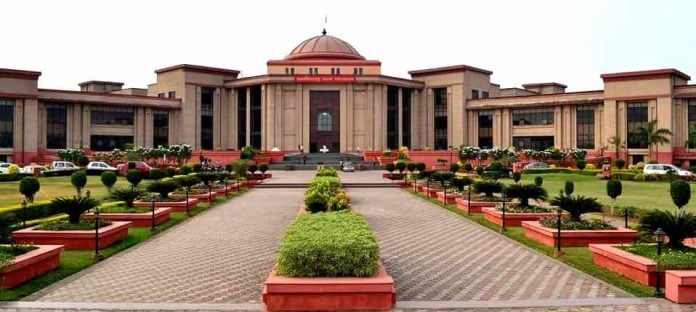The Chhattisgarh High Court has observed that sexual intercourse or any sexual act by a husband with his legally wedded wife is not rape, even if it was by force or against her wish.
A Single Bench of Justice N. K. Chandravanshi on Monday, while hearing a Criminal Revision Petition filed by Dilip Pandey and others, discharged a man of the offence of marital rape.
The Criminal Revision has been preferred by the applicants against the order dated January 22, 2021 passed by the Additional Sessions Judge, Bemetara, District.
The charges under Sections 498-A, 34, 376 and 377 of the Indian Penal Code have been framed against the applicant No.1/Dilip Pandey and charge under Section 498-A of the IPC has been framed against applicants Dinesh Kumar and Varsha Pandey.
Brief facts of the case are that the marriage of the complainant was solemnized with the non-applicant No. 1 on June 8, 2017. Thereafter, they resided together. After a few days of marriage, the applicants started harassing the complainant on demand of dowry – money and other articles.
The applicants also used to abuse her physically and committed domestic violence. The applicant No. 1/husband many times had made unnatural physical relations with her.
The complainant filed a written complaint against the applicants at PS Bemetara. After investigation, charge sheet under Section 498-A, 377, 376, 34 of IPC was filed against the applicants. After affording the opportunity of hearing to the counsel for both the parties, the trial court framed charges against the applicants as mentioned above.
The Counsel for the applicants submitted that the complainant and the applicant No 1 are legally wedded wife and husband, therefore, none of the ingredients to constitute the offence punishable under Sections 376 and 377 of IPC because in India, marital rape is not recognised and the same is not an offence in view of Exception II of Section 375 of the I.P.C.
He further submitted that carnal intercourse against the order of nature with any man, woman or animal voluntarily is a necessary ingredient of Section 377 of IPC, which is not present in the case. Therefore, the order of framing of charges against the applicant No. 1/ husband under Sections 376 and 377 of IPC is illegal and erroneous.
He also submitted that framing of charge of Section 498-A of the IPC against the applicants is also not sustainable.
Therefore, the applicants Counsel prayed that the order be set aside and the applicants be discharged from aforesaid charges.
“From perusal of the copy of the charge sheet, it is clear that the applicant No. 1 and complainant are legally wedded husband and wife and their marriage was solemnized in the month of June, 2017. Exception II of Section 375 of the I.P.C. referred to above, makes it clear that sexual intercourse or sexual act by a man with his own wife, the wife not being under eighteen years of age, is not rape,” noted the Court.
It said that in this case, the complainant is legally weeded wife of applicant No. 1, therefore, sexual intercourse or any sexual act with her by the applicant No. 1/husband would not constitute an offence of rape, even if it was by force or against her wish.
Therefore, charge under Section 376 of IPC framed against the applicant No. 1/husband is erroneous and illegal. Hence, he is entitled to be discharged from the charge under Section 376 of IPC.
“As regards Section 498-A of IPC, a written report and both the statements of the complainant show that after a few days of marriage, she was subjected to cruelty by all the applicants by abusing and committing marpeet on demand of dowry, money and other articles from her parents. Father of complainant Durgashankar Chaturvedi and mother Kanti Chaturvedi have also supported her statement. Those facts have also been stated by their neighbouring witnesses in their police statements. Therefore, I do not find any infirmity in framing charges under Section 498-A/34 of the I.P.C. against the applicants,” it added.
So far as charge framed under Section 377 of the I.P.C. is concerned, complainant/wife has categorically mentioned in her written report that after marriage, the applicant No. 1/husband so many times had made unnatural physical relation with her, but due to shame, she did not disclose about it to anyone.
Read Also: UP govt assures Allahabad High Court of no arbitrary action against traders in cheating cases
The Court said, “In the case, the complainant has reported that the applicant No. 1/ husband has many times, without her consent, made unnatural physical relations with her. which is a matter of evidence, but, only on that ground, charge framed under Section 377 of the I.P.C. cannot be said to be erroneous at the stage of framing of charge, especially, in terms of Section 377 of IPC. where dominant intention of the offender is to derive unnatural sexual satisfaction, repeatedly insert any object in the sex organ of the victim and consequently derives sexual pleasure, such act would constitute as a carnal intercourse against the order of nature and such act would attract the ingredient of offence under Section 377 of IPC. In view of above, judgment of Nimeshbhai Bharatbhai Desai (supra) is of no help to the applicant No. 1/husband with regard to charge under Section 377, of the I.P.C.
“Therefore, I do not find any infirmity or illegality committed by the trial Court in framing the charge under Section 377 of the I.P.C. against the applicant No. 1/husband,” it added
Consequently, the Court allowed the criminal revision petition.
The Court ordered that the applicant No. 1 is discharged from the charge framed against him under Section 376 of IPC.


